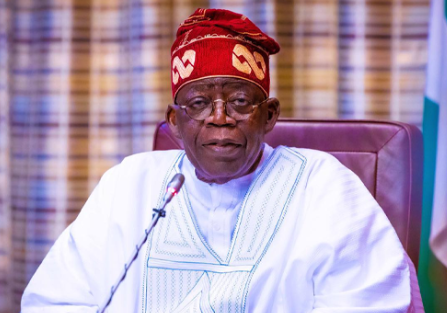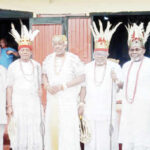
Ahead of the 2024 Oil Licensing Round, President Bola Tinubu has reduced the signature bonus payable by successful bidders from around $200m to $10m.
The Chief Executive of the Nigerian Upstream Regulatory Commission, Gbenga Komolafe, stated this Tuesday during the pre-bid conference held in Victoria Island, Lagos.
According to Komolafe, the NUPRC surveyed what other countries like Brazil demand as signature bonuses from would-be investors and discovered the need to slash that of Nigeria.
A signature bonus is a non-refundable payment made by a contractor to the government upon the signing of an agreement. Individuals who are awarded oil assets are expected to pay signature bonuses to the government.
Komolafe maintained that a heavy signature bonus is a front entry barrier in the Nigerian oil sector and the reason many have not been able to develop assets awarded to them.
Henceforth, the NUPRC disclosed that an investment in deepwater will now attract $10m as a signature bonus while shallow water and onshore attract $7m.
The commission’s chief executive disclosed that the commission made an appeal to President Tinubu on the need to cut down the signature bonus and the request was granted.
“A review of well intelligence energy analytic report on licensing round across the globe including Brazil, Guyana, Angola, Middle East, North Africa, Southeast Asia and so on reveal that the era of a huge front-loaded signature bonus is over. Again, I need to share this with us that the commission in its proactive nature, we’ve taken a survey and a look at what others are doing in terms of vacating front entry barriers.
“And for that reason, we recognise that it is very important for the nation to vacate the entry barriers. We made a case to the government and our dear president, being a business enabler, graciously granted the approval that the front entry barrier be vacated, and this is done in line with international best practices,” he revealed.
Komolafe stated that some individuals who did not understand the reason for the reduction were already writing petitions against him.
“I need to make this public because as I speak, some quarters are already saying, ‘Probe the NUPRC, probe the CCE; they are trying to give out our oil blocks free of charge’. This is because they do not understand what we are doing. People are already writing petitions against the CCE, how will the commission be reducing the signature bonus? They did not know that signature bonuses can only be earned out of a successful bid exercise.
“So, while we are marketing this opportunity to attract investors, we are lucky we have a president who said Nigeria is ready for business. The commission enjoys the support of Mr President to introduce reforms that would help attract investments into the industry. Nigerians should understand that what we are doing is in the best national interest.
“Brazil and other countries are reducing the signature bonus, if for us as Nigeria we still hold signature bonus at about $100m and other, particularly, that is what is responsible for the fact that people use their political and financial muscles to get licences and they don’t do anything with it, they keep hawking it. We have moved courageously from that era and now we want to do business as it is supposed to be done. We want to move with the global best practices, so that we can get results,” Komolafe submitted.
The PUNCH recalls that during a recent forum in Lagos, the Minister of State for Petroleum Resources (Oil), Heineken Lokpobiri, also called for the need to reduce the signature bonus.
To remove one of the barriers in the oil industry, the minister maintained that President Tinubu allowed the ministry and the NUPRC to reduce the cost of signature bonuses to its barest minimum.
“About signature bonus, as a policy from the Ministry of Petroleum working together with the NUPRC, we have the buy-in of Mr President that, we should remove all entry barriers in the oil industry, one of which is the high cost of signature bonuses.
“As I came into office, I have had over 200 cases of people taking me to court for things I don’t know anything about. Some of them have to do with people who were beneficiaries of some of these oil blocks. They were given either $200m to pay as signature bonuses; $150m, or $100m, and they haven’t been able to pay. And the licence itself is very clear; the licence becomes yours only when you can make full payments; and because they have not been able to pay anything, those licences have lapsed automatically.
“But by the time we try to bring them back to the basket, they take us to court, bribe one judge who will give an injunction. So, what we’ve decided to do is, let’s reduce the signature bonus to the barest minimum,” he explained.
However, Lokpobiri noted that the reduction in signature bonuses would come with a deadline for payment, failure of which would lead to the automatic forfeiture of oil licences.
He said, “Going forward, what you will see is reducing the signature bonus to the barest minimum, but we will also give a specific timeline, which you will sign. When you sign, the expectation is that we want you to take that money you would have used to pay for signature bonuses to invest in those blocks.
“But you will sign, if you sign and you do not make the investment within that period, your licence will expire automatically”.
Speaking further, Komolafe added that the commission has increased the number of oil blocks in the bid round from 12, saying the number of additional blocks would be announced later.
Meanwhile, to qualify for the bid round, the NUPRC Assistant Director, Multiclient Surveys and Regional Studies, Ahmad Abdullahi, disclosed that organisations must possess a financial capacity of about $200m for deep offshore and $150m for shallow water and onshore.
The NUPRC enjoined interested bidders to visit the NUPRC portal for details about the bidding process, which will last for nine months.
The commission emphasised that successful bidders would lose their licences if they failed to develop the assets within an agreed period.
Our correspondent reports that the pre-bid conference had in attendance stakeholders in the oil and gas industry, who participated in different sessions to chart the way forward for the Nigerian energy sector.
Meanwhile, the Federal Government, on Tuesday, said some of the deep offshore oil blocks being showcased for the 2024 Licensing Round had never been tapped or explored by any investor.
It disclosed this at the Pre-Bid Conference for the 2024 Licensing Round hosted by the Nigeria Upstream Petroleum Regulatory Commission in Abuja.
In his speech at the conference, the Chief Executive, NUPRC, Gbenga Komolafe, told industry stakeholders that in a bid to exploit and optimise the abundant hydrocarbon resources in Nigeria, Section 7(t) of the Petroleum Industry Act empowered the industry regulator to conduct bid rounds.
He said the rounds were for the award of Petroleum Prospective Licences and Petroleum Mining Licences under the Act and applicable regulations.
“It is on this premise that the Federal Government through the NUPRC recently announced the commencement of the 2024 Licensing Round both in-country and outside the shores of the nation,” Komolafe stated.
On what to expect in the latest round, he said, “This round introduces some meticulously selected blocks across diverse geological spectra — from the fertile onshore basins to the promising continental shelves and the untapped depths of our deep offshore territories.
“Each block has been chosen for its potential to bolster our national reserves and stimulate economic vitality.”
The NUPRC boss noted that subsequently, on May 13, 2024, the commission opened a dedicated bid portal to allow prospective bidders to register/submit Pre-Qualifications documents on or before the stipulated June 25, 2024 deadline.
“Interestingly, the commission, in partnership with its multi-client partners, has acquired more geological data resulting in the identification of more prospective blocks. The newly identified blocks will be added to the pool of blocks originally scheduled for the bid exercise, and their details will be made available on the bid round portal.
“In addition to these blocks, the seven deep offshore blocks from the 2022 Mini-Bid Round Exercise which cover an area of approximately 6,700 km2 in water depths of 1,150m to 3,100m shall also be concluded along with this licensing round,” Komolafe stated.
He said the licencing round is indeed expected to be a huge success for Nigeria and is a big step towards growing the nation’s oil and gas reserves through aggressive exploration and development efforts, boosting production, expanding opportunities for gas utilisation and end-to-end development across the value chain.
He said the rounds would strengthen energy security and the economy, provide an occasion to gainfully engage the pool of competent companies in the oil and gas sector with a multiplier effect in employment opportunities, enable the transfer of technology, value optimisation from petroleum assets and attract investments.
“In addition, the licencing round presents us with the opportunity to reinforce Nigeria’s commitment to openness and transparency in line with the principles of the Extractive Industry Transparency Initiative.
“The 2024 Block Licensing Round is scheduled to last for approximately nine months and all interested parties are once again invited to visit the dedicated NUPRC for details on how to participate,” Komolafe stated.




